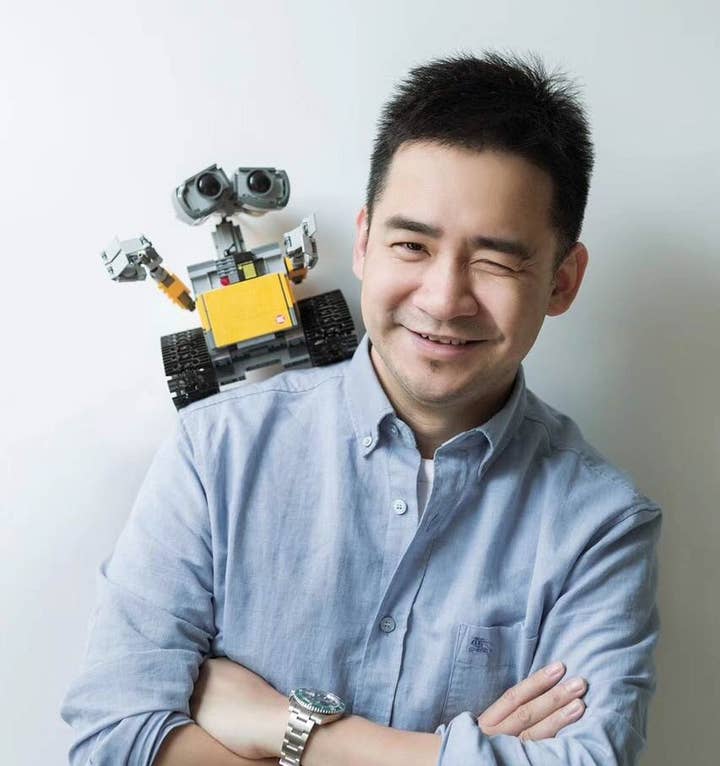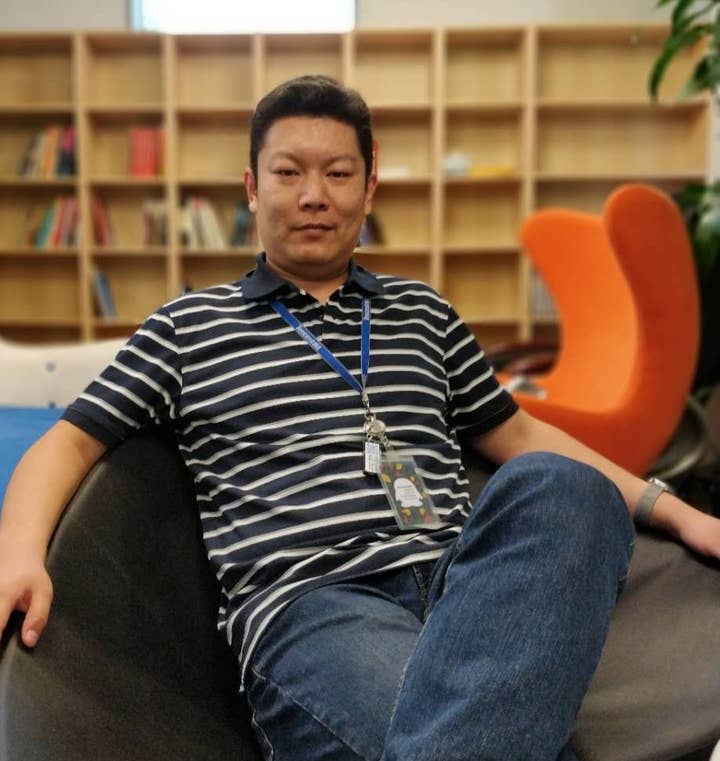How an unlikely Tencent project is helping China's indie scene
In its third year, Tencent's Next Studios is carving out a unique niche in China's complicated games industry
From a foreign perspective, walking through the booths at Shanghai's WePlay convention, it's easy to assume that Next Studios is just another well-run indie studio with a plethora of offerings -- audio-based mystery Unheard, co-op physics game Biped, and dungeon crawler CrownTrick are just a few titles on its award-winning roster.
But Next Studios is a part of Tencent, the biggest video game company in the world, and a giant in both telecommunications and artificial intelligence. It seems that two things can be true: First, that Next is an important and necessary part of China's indie landscape, and second, that Next is not an indie studio, and its games are not indie games -- it prefers the term "original" games.
"From a local developer's perspective... Next is pushing new projects that otherwise might not get made and helping China to make a mark on original game production," explains Deng, a solo designer who wished to remain anonymous when speaking about Tencent. Even so, it's difficult to reconcile what the world understands as "indie" with Next's powerful parent, which has an appetite for buying smaller companies. Why does Tencent not simply eat the small indie studios?
"Next is pushing new projects that otherwise might not get made and helping China to make a mark on original game production"
Deng, indie developer
For starters, China doesn't buy into the dichotomy between AAA and indie that is prevalent in western games discourse, because it doesn't apply to the Chinese industry. In many ways, "indie" has become a loaded term, usually defined as a game made by a small team (or solo developer) without financial backing or corporate resources, which often places personal and professional hardships on its creators. For better or worse, the perception of indie games is changing as big companies scramble to appeal to more genres and communities.
"[Next's] methods are disrupting what western developers consider indie," Deng adds. "By having major backing through Tencent and being run in a huge studio system, is that the same as making a game with little to no resources?" A western developer would probably say no.
But away from western development circles, "indie" can be divisive and hard to nail down. Logistically, Chinese game designers face such a different reality that it doesn't make sense to use the same vocabulary. Unlike other countries, where it's possible to work as a solo developer or churn out a game with a few friends, the landscape in China is unpredictable and difficult for small studios. Indie developers must obtain numerous licenses, pay substantial -- and non-refundable -- application fees, and jump through legal and bureaucratic hoops that are constantly at risk of being changed.

Shanghai-based developer Keith, who also declined to have his real name published, works closely with the annual IndiePlay competition. He says that many Chinese developers don't consider Next Studios' games as indie.
"Almost everything in China is different from the global scene," he continues. "Most people in China take the phrase 'indie game' as an alternative for 'original game'... But people from the [global indie community] think otherwise."
That isn't necessarily bad. Keith expresses enthusiasm and support for what Next is doing: reimagining the landscape of the burgeoning Chinese games market, which remains the biggest in the world. In a land dominated by mobile and free-to-play games, Next is pouring resources into its developers, nurturing a culture of originality in a market distinguished by clones.
Studio head Li Shen founded Next in early 2017 after convincing his boss to let him run a new creative studio within Tencent. "At that time I managed several development teams, including Monster Hunter Online in China," he recalls. Some teams were making drones and even smart toys, and Shen merged roughly 100 people together to create the foundation for Next.
"Almost everything in China is different from the global scene"
Keith, indie developer
Unlike Tencent's four main studios, Next -- its fifth and arguably most experimental division -- is under different management and has a different goal. When asked what exactly that goal is, Shen laughs: "It's complicated... In the first two years, I think our goal was to create a unique experience. And a unique experience usually means, with every game, each game has a very unusual strength. The advantage could be in the narrative... The art style could be different to others. The gameplay could be something that's never been done."
Next Studios' focus on innovation and originality prompted Clark Yang, an industry veteran with 15 years' experience, to finally move back to China in 2017. Previously, Yang spent 12 years in Montreal, working on every Ubisoft property except for Assassin's Creed, as well as on the Arkham series at Warner Bros. Yang and Shen knew each other from their time at Ubisoft Shanghai, and Shen invited him to join Next's fledgling operation. Yang, intrigued by the prospect of doing something different, agreed.

Most of Yang's experience had been on single-player AAA projects and narrative games. At Ubisoft, he worked as a mission director on a 3000-person team that operated on extreme specialisation. "It doesn't matter how good you are, you only take care of one little thing," Yang says. "For example, I was a mission director. I only did missions. I didn't need to worry about what concept was doing, I didn't need to worry about what animation was doing, I knew that I would be fine."
At the end of the day, all Yang had to do was focus on his 40 missions. But the Chinese market, filled with free-to-play multiplayer games and microtransaction-based economies, was new territory for him: "For a long time, I was thinking maybe I'd never be able to come back to China, because my experience could never be used. It seemed like two different worlds."
Yang currently serves as creative director for Synced: Off-Planet, Next's ambitious multiplayer zombie action game that offers both PvE and PvP gameplay. In contrast to the massive teams at Ubisoft -- or even the smaller 100- to 200-person teams at Warner Brothers -- Yang now has a 70-person team where he has to do a bit of everything. Of course, this is also a key characteristic of development in the western indie industry, where small teams must work on every aspect of a game.
"Lots of indie teams have backgrounds of big companies investing money in them, so do you still consider it indie?"
Li Shen, Next Studios
But this marks another difference in the way Chinese games jargon describes game developers, which, again, is different from western jargon. In China, game developers are called "zhizuoren" -- self-producers or self-made people -- or simply "producers," a term that refers to a distinct role in western studios. They are responsible for the entire project, and this isn't too far away from what western indie developers have to do to manage a project with limited resources and budget.
Yang describes how designers at Next need to have a hand in everything from the UI to animations and VFX, which will help team members grow faster. "I think we'll get even more experience by doing a game like this," he says, rather than being siloed in a major studio system.
As of 2020, Next has a little under 400 employees, 300 of whom are devoted to their primary mandate of original games. The remaining 100, says Shen, are making "serious games" for functional purposes at schools and hospitals. "There are also some people who do research on technology," he says, perhaps hinting at the future shape of Next's changing goals.

Shen's hope is for Next to become a globally recognized studio, free from the confines of the "indie or not" debate. "If the game designer... has creative freedom -- instead of being guided a lot by commercial needs -- then we can consider it as an indie team," he says, referring to public perceptions of Next. "Nowadays, lots of indie teams have backgrounds of big companies investing money in them, so do you still consider it an indie game team? So, it's just like, how do you define that?"
"My fear is that [Next Studios] are using the indie branding to capture a hot market"
Deng, indie developer
It's difficult to truly consider a Tencent product as an independent anything, and Shen conceded that working in such a vast company isn't so easy, "because the resource allocation can be quite pre-fixed and distributed according to the commercial games' needs." From Yang's perspective, making original games is a challenge no matter where you work.
"Not only do you have to make a game that players want to play... but for us, because you have so many people working for you, for two, three years you have a big cost," he says. "You have to be commercially successful, otherwise you're not going to do another one -- it's very simple."
Yang believes that Next -- despite its position outside of the indie community -- is helping indie games in China to grow, by offering hope to young developers who can see that originality and innovation have a place in the Chinese industry.
"If you look at the industry as a whole, you need to have the premium games to lead the way, to make sure the developers are getting the experience they need," he explains. "Even some people not working with us, not working on this project, can see that in China, a company like ours can do things like this. It will give them a lot of hope, if I may."
But at the end of the day, he says, "indie studios, in China especially, have to look at the global market -- they can't only look at the Chinese one." It's a sensible but interesting take, given recent concerns about Steam's fate in China. Valve's platform is one of the main ways -- if not the only way -- that many Chinese developers can freely market their games to an international audience.
Still, Deng is concerned: "My fear is that [Next Studios] are using the indie branding to capture a hot market. Maybe this will become the new standard for indie developers, in which AAA studios fund multiple small teams to push through their own agendas." For the moment, though, Next seems to offer developers in China an alternative to a market saturated with clones and MOBA (multiplayer online battle arena) games. And perhaps, given its various limitations and constraints, that's exactly what the Chinese industry needs.

